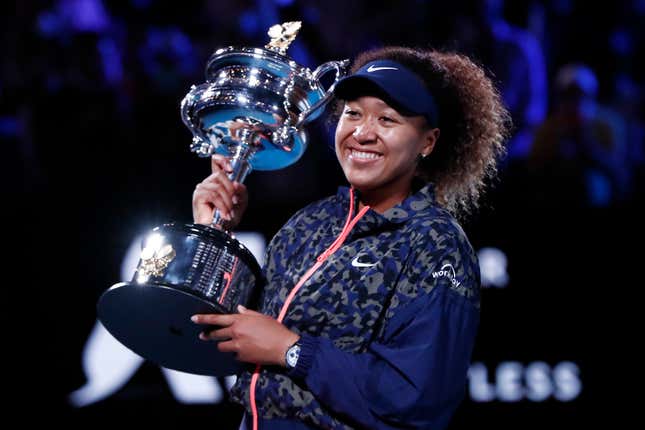
As one of the premier athletes in professional sports, tennis champion Naomi Osaka is committed to ensuring that her success creates other opportunities for women and girls eager to follow in her footsteps.
To support that cause, last summer she launched the Play Academy with Naomi Osaka in Tokyo, which provides grants and training for community organizations, emphasizes gender inclusivity, and focuses on increasing girls’ participation in sports. And now, nearly a year later, the Play Academy has teamed up with Nike and Laureus Sport for Good to expand to Los Angeles (where the 23-year-old both lives and trains) and Haiti (where her father is from).
In LA, Play Academy will partner with community organizations that work to support girls, with a focus on Black, Asian, and Latino communities in East Los Angeles and South Los Angeles. In Haiti, it will partner with GOALS Haiti and support its mission to advance youth leadership through soccer and education to create stronger, healthier communities in rural Haiti.
In an exclusive interview with The Root, Osaka discussed how role models have been instrumental to her own success and how Play Academy will nurture and inspire the next generation of athletes.
“I’ve had many role models in my life, both on and off the court,” she said. “My mother worked incredibly hard to support me and my passion to play tennis. My sister motivated me to do better since day one. My heroes in the sport have inspired me to level up. And all of them have taught me to embrace my diversity and to put others first. It still blows me away whenever someone tells me their kids look up to me as a role model, or thanks me for setting a good example. I think today’s role models should stick to their beliefs, remain humble, and encourage others to dream big.”
In discussing her decision to create the academy, she pointed to how playing tennis has allowed her to accomplish her dreams and expressed her desire to extend the same opportunity to other women and girls.
“Ever since I picked up a tennis racket when I was three, my life changed,” she said. “Tennis helped me gain confidence and power. It taught me that I can dream big and achieve my goals. It also taught me how to stand up and fight for what I believe in. I recognize how lucky and fortunate I am to have had these opportunities within reach at such a young age.”
She continued, “But there are so many young girls—and especially girls from marginalized communities—who face incredible barriers to play and sport. The more I learned about these barriers, through my work with Nike and Laureus Sport for Good, the more I felt determined to do something about it. It started with conversations and then became this incredible program with community partners that are committed to leveling the playing field for girls.”
Expansion obviously includes notable risk—especially considering the challenges we’ve faced throughout the course of this pandemic. But despite these circumstances, the four-time Grand Slam singles champion insists that there’s no better time than now.
“We wanted to build on our work in Japan, where we’re already partnering with three amazing community organizations,” she said. “I wanted to champion this cause in other communities that I’m personally connected to—and Los Angeles and Haiti are very close to my heart. I currently live and train in LA, and Haiti is where my father is from.”
She continued, “The events from this past year have made it clear that if we want to create a more equitable future, we need to take action now. And the more girls we can reach at an early age, the more empowered they’ll feel to chase their dreams.”
As we’ve reported plenty of times here at The Root, Osaka is very much about that action when it comes to addressing racial injustice in America. The Play Academy feels like a natural extension of those efforts, especially with its emphasis on Black, Asian and Latinx girls.
“Around the world, girls drop out of sport at twice the rate that boys do by the time they reach 14,” she explained. “Here in the U.S., girls from Black, Asian and Latino communities face greater barriers and need more opportunities to access and benefit from play and sport. That’s why we’re partnering with community organizations in Los Angeles and Haiti who are working to support girls and level the playing field for them. All kids—especially girls—deserve a chance to play, no matter where they come from or what they look like. The more we provide girls, and those from marginalized communities, with opportunities to be active, the more we empower them to become future leaders in their communities.”
I couldn’t have said it better myself.
“Girls are made to play!” she said. “And as adults, we can all do our part to give girls more opportunities to play and fall in love with sports, so they can become changemakers for their communities and help break barriers for more girls.”
To learn more about Play Academy, visit its website.



